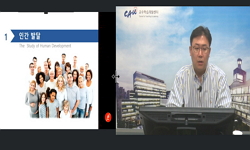본 연구의 목적은 장애 아동의 사회적 능력 발달을 위한 교육의 일환으로 신체감각게임 활동을 적용하여 그 효과를 검증, 분석한 다음 장애 아동의 사회적 능력을 효율적으로 증진시키는 데...
http://chineseinput.net/에서 pinyin(병음)방식으로 중국어를 변환할 수 있습니다.
변환된 중국어를 복사하여 사용하시면 됩니다.
- 中文 을 입력하시려면 zhongwen을 입력하시고 space를누르시면됩니다.
- 北京 을 입력하시려면 beijing을 입력하시고 space를 누르시면 됩니다.
신체감각게임 활동을 통한 장애 아동의 사회적 능력 연구 = A study on Social Competence of the Handicapped Young Children Through Physical Sensory Game Activities
한글로보기https://www.riss.kr/link?id=T12620328
- 저자
-
발행사항
진주 : 한국국제대학교 대학원, 2011
-
학위논문사항
학위논문(석사) -- 한국국제대학교 대학원 , 유아교육학과 , 2011. 2
-
발행연도
2011
-
작성언어
한국어
- 주제어
-
발행국(도시)
경상남도
-
형태사항
v, 60 p. ; 26cm
- 소장기관
-
0
상세조회 -
0
다운로드
부가정보
국문 초록 (Abstract)
첫째, 신체감각게임 활동은 장애 아동의 나누기 능력 향상에 효과가 있었다.
둘째, 신체감각게임 활동은 장애 아동의 도와주기 능력 향상에 효과가 있었다.
셋째, 신체감각게임 활동은 장애 아동의 다른 사람에게 관심가지기 능력 향상에 효과가 있었다.
넷째, 신체감각게임 활동은 장애 아동의 또래관계 형성하기 능력 향상에 효과가 있었다.
다섯째, 신체감각게임 활동은 장애 아동의 규칙 지키기 능력 향상에 효과가 있었다.
여섯째, 신체감각게임 활동은 장애 아동의 사회적 의사소통 능력 향상에 효과가 있었다.
이상의 결과를 통해 신체감각게임 활동은 장애 아동의 사회적 능력을 향상시키는 데 효과적이었다고 할 수 있다.
본 연구의 목적은 장애 아동의 사회적 능력 발달을 위한 교육의 일환으로 신체감각게임 활동을 적용하여 그 효과를 검증, 분석한 다음 장애 아동의 사회적 능력을 효율적으로 증진시키는 데 필요한 기초 자료를 제공하는 데 있다. 이를 위하여 경상남도 J시 소재의 어린이집 1개 기관에 있는 장애 아동을 대상으로 주 2회 신체감각게임 활동을 적용하여 10주간 실시하였다. 장애 아동의 사회적 능력을 실험 전과 실험 후 검사를 실시하였으며, 대응표본 t-test를 실시한 주요 결론은 다음과 같다.
첫째, 신체감각게임 활동은 장애 아동의 나누기 능력 향상에 효과가 있었다.
둘째, 신체감각게임 활동은 장애 아동의 도와주기 능력 향상에 효과가 있었다.
셋째, 신체감각게임 활동은 장애 아동의 다른 사람에게 관심가지기 능력 향상에 효과가 있었다.
넷째, 신체감각게임 활동은 장애 아동의 또래관계 형성하기 능력 향상에 효과가 있었다.
다섯째, 신체감각게임 활동은 장애 아동의 규칙 지키기 능력 향상에 효과가 있었다.
여섯째, 신체감각게임 활동은 장애 아동의 사회적 의사소통 능력 향상에 효과가 있었다.
이상의 결과를 통해 신체감각게임 활동은 장애 아동의 사회적 능력을 향상시키는 데 효과적이었다고 할 수 있다.
다국어 초록 (Multilingual Abstract)
For this purpose, physical sensory game activities were applied 2 times per week over 10 weeks with handicapped children in the child center of J city in south Gyeongsang province. The tests about the social competence of handicapped children were conducted before and after the research, and the results that were analyzed by paired t-test are as follows;
First, physical sensory game activities are effective for the improvement of the handicapped children's ability to divide.
Second, the activities are effective for the advancement of the children's ability to help others.
Third, the handicapped children's ability to have interest in others was significantly improved by utilizing physical sensory game activities.
Fourth, the children's ability to make relationships with peers was more effective in the process of the activities.
Fifth, the children showed significant progress in following the rule by doing physical sensory game activities.
Sixth, the children's social competence was improved by doing the activities.
Through the result above, physical sensory game activities could be said that the activities were effective to improve handicapped children's social competence.
The purpose of this study was to provide the basic data needed to improve handicapped young children's social competence effectively after applying physical sensory game activities, verifying and analyzing their effectiveness, as a part of the educati...
The purpose of this study was to provide the basic data needed to improve handicapped young children's social competence effectively after applying physical sensory game activities, verifying and analyzing their effectiveness, as a part of the education for the development of handicapped children's social competence.
For this purpose, physical sensory game activities were applied 2 times per week over 10 weeks with handicapped children in the child center of J city in south Gyeongsang province. The tests about the social competence of handicapped children were conducted before and after the research, and the results that were analyzed by paired t-test are as follows;
First, physical sensory game activities are effective for the improvement of the handicapped children's ability to divide.
Second, the activities are effective for the advancement of the children's ability to help others.
Third, the handicapped children's ability to have interest in others was significantly improved by utilizing physical sensory game activities.
Fourth, the children's ability to make relationships with peers was more effective in the process of the activities.
Fifth, the children showed significant progress in following the rule by doing physical sensory game activities.
Sixth, the children's social competence was improved by doing the activities.
Through the result above, physical sensory game activities could be said that the activities were effective to improve handicapped children's social competence.
목차 (Table of Contents)
- Ⅰ. 서론 1
- 1. 연구의 필요성 1
- 2. 연구의 목적 3
- 3. 연구 문제 3
- 4. 용어의 조작적 정의 4
- Ⅰ. 서론 1
- 1. 연구의 필요성 1
- 2. 연구의 목적 3
- 3. 연구 문제 3
- 4. 용어의 조작적 정의 4
- Ⅱ. 이론적 배경 6
- 1. 장애 아동을 위한 신체감각게임 활동 6
- 1) 신체감각게임 활동의 정의 6
- 2) 신체감각게임의 교육적 효과 7
- 3) 장애 아동의 신체발달 특성 8
- 2. 유아의 사회적 능력 9
- 1) 유아의 사회적 능력의 개념 9
- 2) 유아의 사회적 능력 발달 10
- 3) 장애 아동의 사회적 능력 발달 12
- (1) 지적 장애 아동의 정의 12
- (2) 지적 장애 아동의 사회적 능력 13
- (3) 자폐성 장애 아동의 정의 14
- (4) 자폐성 장애 아동의 사회적 능력 15
- 3. 선행연구 17
- Ⅲ. 신체감각게임 활동 구성 21
- 1. 신체감각게임 활동 목표 및 내용 21
- 2. 신체감각게임 활동 교수·학습 방법 25
- Ⅳ. 신체감각게임 활동 적용 및 평가 27
- 1. 평가 대상 27
- 2. 평가 도구 30
- 3. 평가 절차 32
- 4. 평가 결과 34
- Ⅴ. 결론 및 제언 49
- 1. 논의 및 결론 49
- 2. 제언 52
- 참고문헌 54
- 영문초록 59












